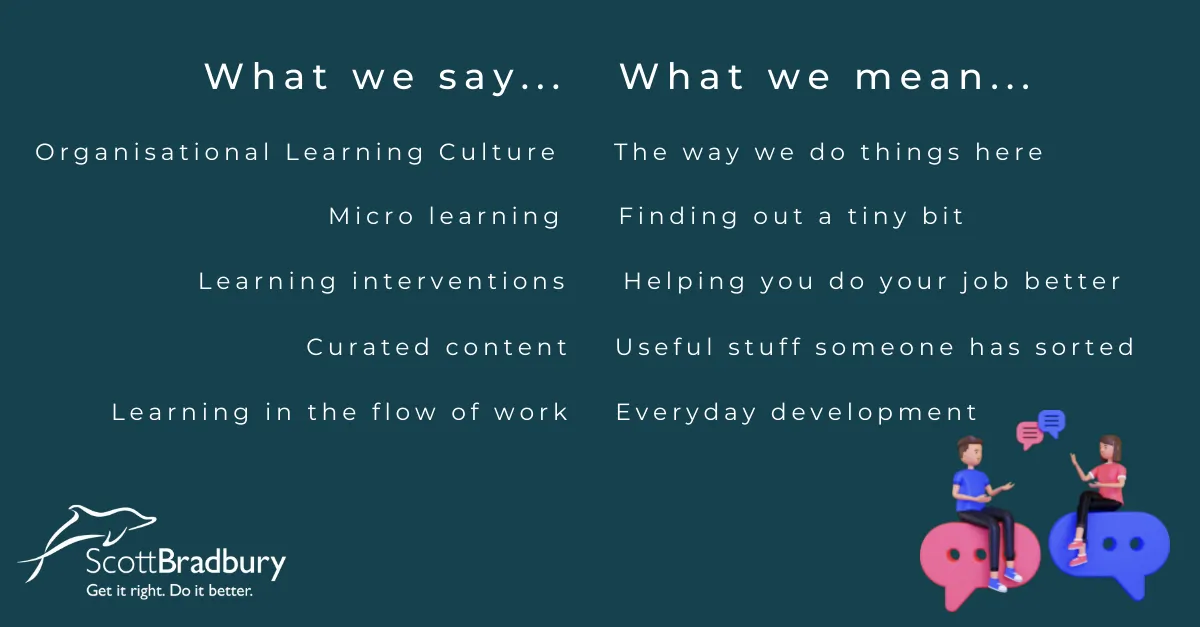
We attended Learning Live last week and have plans to head to Birmingham next month for the World of Learning. It’s always great to meet up with some familiar faces from L&D and meet new ones.
One of the things we were struck with when reading the agenda for both events was the language used to describe the seminars, keynote speeches and discussion forums. It went from ‘reculturing’, ‘capability building program’, ‘psychological safety’, ‘the metaverse’, to ‘learning architecture’, ‘democratising digital culture’ and ‘learning in the flow of work’. All really interesting stuff but it got us thinking about how, if we look at it from an employee perspective, it sounds like a lot of jargon. There seems to be a whole new set of buzzwords and vocabulary for us all to understand.
I remember in my early days of working in IT having to get used to ‘tech speak’, in later years tuning into ‘education speak’ as my children progressed through school. Now I’m presented with ‘HR speak’. When we come back from these conferences and start enthusing about all our new ideas, are our people really understanding our terminology or are we at fault for jumping on the jargon bandwagon? There are always new words to learn, new trends, new ideas, but it’s how we package and present it that really matters.
Ultimately the HR team need to speak and present in a way that everyone in the organisation understands. I’ve been on the receiving end and sat, watched, and listened as the latest greatest research into workplace learning is spun out with terminology that at its clearest can be unfathomable. If there is a difference, or dare I use the word ‘disconnect’ between what the employee understands and the language that the HR team talk, and when I write that I mean no disrespect to the employee, then we’ve lost the opportunity to engage our learners.
I confess I had to look up ‘Reculturing’ when I saw it on one agenda. Whilst I could make an educated guess at what it meant, Google returned with ‘redesigning and reconnecting behaviours, processes, and practices to each other and to the organisational system.’. I think if I presented that statement to my MD explaining why I wanted to embark on ‘reculturing’ I might be met with a despairing look. So, when I sit back and reflect on what ‘reculturing’ means to me and my organisation, it’s ultimately about change. Re-organising the team in a way that works both for them and for the organisation. It’s about simplifying and presenting ideas in a practical way.
I’ve been tuning into recent Ted talks and seeing the words: re-imaging, re-engineering, re-examining, re-inventing, re-engaging. It’s all about ‘re’ something. So, is it simply something old packaged up as something new or is it an original idea? Ultimately, I wonder whether it really matters, the real issue is whether the things HR are doing are having a real impact and are really understood.
I was speaking to a customer last week who mentioned she had attended a webinar on ‘the metaverse’. She, like me, felt like a Luddite. Whilst our teenagers are completely switched on to their futuristic, sci-fi vision, we feel a bit like we are being left behind and really need to jump on the bandwagon. Or do we? Is the metaverse (for the unaware it’s a network of 3D virtual worlds focused on social connection or so Google tells me) something that we really need within HR? My customer came away from her webinar with a greater understanding of the concept and was sitting down to think about how she could bring the concept and some of its ethos to her teams.
So, it’s not about shying away from this terminology, it’s about getting to grips with what it actually means for you and for your team, and then presenting it in a way that everyone will relate to and engage with. Whilst the conferences might all be about the buzz words, let’s speak some plain English to our people. At Scott Bradbury we aim to use the language of our customers those that are listening to our Sound Advice podcasts and watching our videos. We need to simplify the way we speak, be intentional and clear so that our conversations, marketing and interactions with our people are understandable and recognisable. But feel free to pick us up if we slip up from time to time!